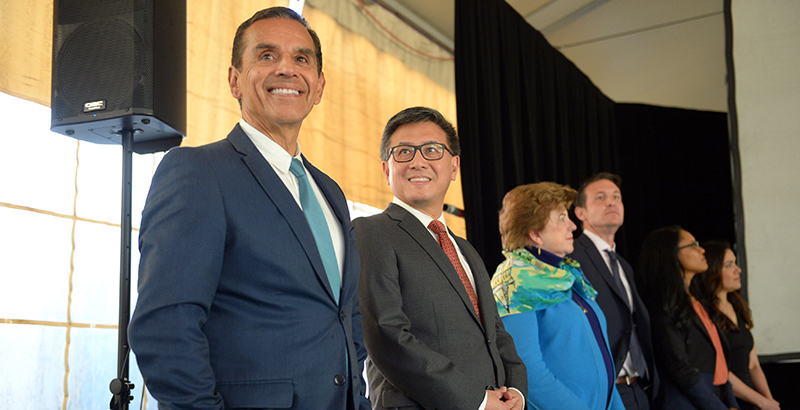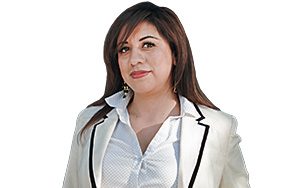‘I Will Be the Education Governor’: Former L.A. Mayor Antonio Villaraigosa Recaps K-12 Track Record — and Flags Statewide Education Priorities — at Children’s Forum

This article was produced in partnership with LA School Report
Even before he stepped onto the stage at Tuesday evening’s forum for gubernatorial candidates on children’s issues, former Los Angeles mayor Antonio Villaraigosa let it be known that schools would be at the forefront of his statewide agenda.
“I will be California’s education governor,” he told LA School Report backstage on the campus of Los Angeles Trade Technical College near downtown.
Minutes later onstage, he doubled down on that sentiment in front of several hundred voters and tied his aspirations for governor to his track record of accomplishments in Los Angeles: “I was the education mayor because too many schools were failing students, and I will be the education governor.”
But first, he has to make it past the June 5 primary election.
Three weeks away from the primary, Villaraigosa is in a heated battle for second place. California’s lieutenant governor, Gavin Newsom, has a wide lead, and Republican John Cox, a Southern California businessman who has run for office unsuccessfully several times, has been polling a few points ahead of Villaraigosa, though polling results have been uneven.
But neither Newsom nor Cox showed up at Tuesday’s “Building Our Future: A Forum on Children With California’s Gubernatorial Candidates.” And Villaraigosa was the hometown media favorite, basking in the spotlight and surrounded by students peppering him with questions as the other two candidates at the forum, former state Superintendent Delaine Eastin and state Treasurer John Chiang, stood by quietly.
The forum was co-hosted by The Chronicle of Social Change, the Children’s Defense Fund-California, and the Children’s Partnership, and addressed children’s issues including educational equity, immigration, child welfare, juvenile justice, and poverty.
Villaraigosa vowed to make sure the money gets to the students with the highest needs.
His message to families across the state whose children are not getting a quality education, he told LA School Report before the forum, is that he will focus on “investing in education from early childhood education, full kindergarten, all the way to college.”
“We need to identify high-needs students; those high-need students need more resources. The problem is that school districts spread the money like peanut butter to all schools,” he said.
“We will look at data, see what schools are doing well, use data to make sure that we can replicate best practices.”
Chiang focused on more accountability: “We need to hold everyone accountable for the academic and psychological development of our children.”
Eastin, who decried the state’s decline in education funding, said the solution is more money across the board: “School funding has to become the centerpiece of the state budget again.”
When Eric Dory, 11, a student at Open Magnet Charter School in South Los Angeles, asked the candidates what he should tell his peers about each of the candidates, Villaraigosa responded, “I hope you tell them that track record matters.”
During his two terms as mayor in Los Angeles, from 2005 to 2013, Villaraigosa was called the “education mayor” not so much for his accomplishments as for his evident efforts toward, and direct involvement in, improving the lowest-performing schools. During the forum, he mentioned again and again his record on education, including increasing graduation rates during his tenure, when LA Unified’s graduation rate rose from 44 percent to 72 percent. One year after he left the mayor’s office, the graduation rate for Latino students went from 40 percent to 76 percent, and to 71 percent for black students.
Villaraigosa spoke about his own struggles as a student. He grew up in Boyle Heights, attending Catholic schools and then LA Unified’s Roosevelt High School. He was able to make it to college and graduate thanks to the support of teachers. He has called his higher education opportunity “transformative.”
“From personal experience, I know how essential a good education is to success and reaching the middle class. Throughout my career I have worked to strengthen our education system,” Villaraigosa told LA School Report in March when he unveiled the California Students’ Bill of Rights.
On immigration, he sent a message to DACA students Tuesday night.
“In California, we’re going to stand up for your right to an education, your right to health care, your right to participate in the economic and social and political fabric of the state. We can’t do anything about what’s going on in Washington, but in Sacramento and California we’re going to stand not just for the DACA students, but also for their parents and their families,” he told LA School Report before the forum.
At its close, Villaraigosa turned to Eastin and Chiang and congratulated them on their dedication to the race — a thinly disguised swipe at Newsom. “I think showing up matters,” Villaraigosa said.
He added, “Civility matters. I want to thank the two of you. You’ve shown the state that you care.”
Addressing Eric, the fifth-grader, Villaraigosa said, “I promise you and your friends that I’m going to stand up for you my entire life.”
Get stories like these delivered straight to your inbox. Sign up for The 74 Newsletter

;)
